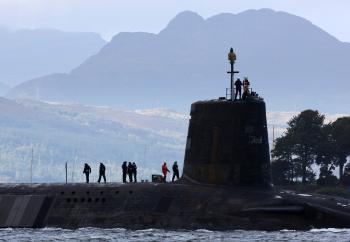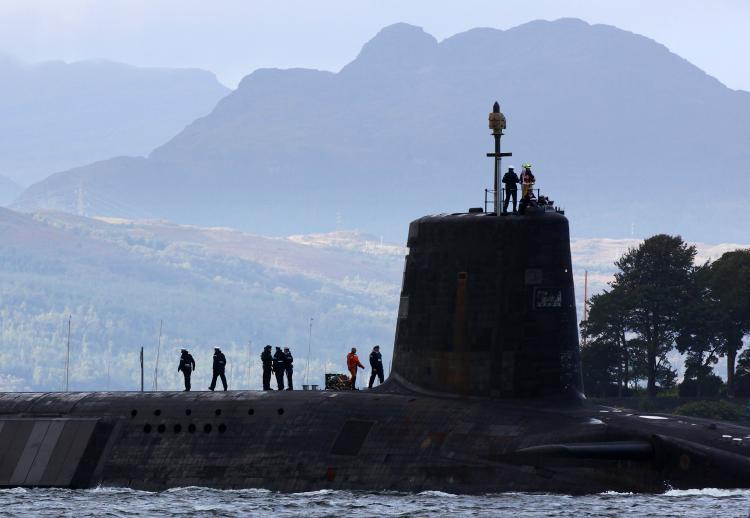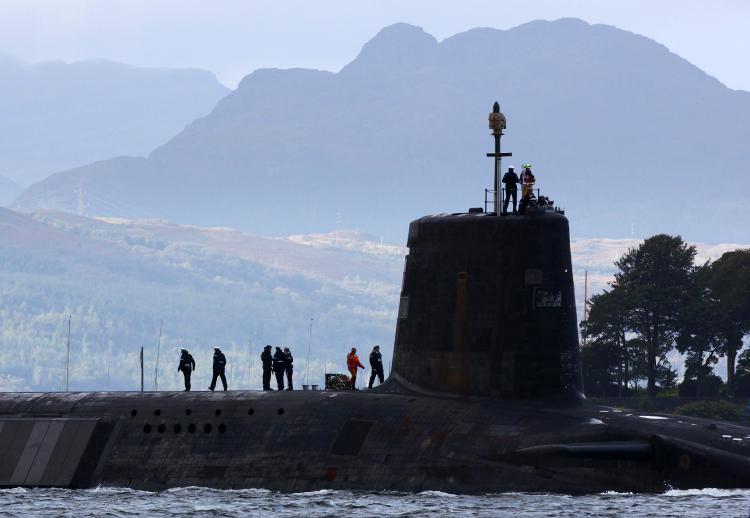Every day without fail for the past 40 years, a jet-black submarine has patrolled the seabed around the coast of Britain armed with a nuclear arsenal large enough to destroy the city of Hiroshima 48 times over.
The crew does not know where they are geographically, and if they fire one of the vessel’s deadly ballistic missiles, they are not told who their targets are.
Operating in three-month shifts, the cutting edge Vanguard-class submarines work in absolute silence.
Once known as Polaris, but for the last 16 years known as Trident, the U.K.’s nuclear deterrent continues to operate like clockwork, despite the Cold War being long over.
What will replace them when they become obsolete in 14 years is now an issue that has occupied officials in the most recent election.
Although the decision to replace the submarines was agreed upon in 2007, both the Liberal Democrat Party and a group of senior military officials say that in the current economic climate an investment of up to 80 billion pounds (US$119 billion) cannot be justified.
As the U.S. government and Russia sign a joint pact to respectively reduce their own nuclear arsenal, military chiefs say the decision to renew the Trident program is anachronistic.
In a joint letter to The Times newspaper, Field Marshal Bramall, Gen. Ramsbotham, Gen. Sir Hugh Beach, and Maj. Gen. Patrick Cordingley, said the expenditure could not be justified.
“Internationally there is a growing consensus that rapid cuts in nuclear forces, starting with the United States and Russia, but with the smaller nuclear states following, is the way to achieve international security,” they wrote.
Britain currently faces a hole of an estimated 35 billion pounds (US$52 billion) in its defense budget, leaving thousands of troops in Afghanistan facing shortages of potentially lifesaving equipment.
The generals’ letter added that going ahead with Trident would “clearly have long-term consequences for the military and the defense equipment budget that need to be carefully examined.”
Nick Clegg, the leader of the Liberal Democrats, said that the renewal of Trident was based on “Cold War assumptions about the threats that Britain faces.”
“Why are we investing a huge tranche of future equipment budgets in military platforms that will be of little or no use fighting terrorist groups or insurgency?” he wrote in a recent editorial.
In 2007, Labour put the cost of renewing Trident at 15 billion-20 billion pounds (US$22-30 billion). However, the cost of the submarines has risen in recent years.
In January, the U.S. House of Representatives Armed Services Committee heard that the cost of building the U.S. equivalent Ohio-class submarines has risen from $3.4 billion to between $6 billion and $7 billion.
U.S. Defense Secretary Robert Gates has questioned the merit of replacing the country’s 12 nuclear submarines that will be obsolete in 2027, raising questions about the cost of Britain’s own Trident program.
The two countries use much of the same technology and research costs are shared. If the United States were to cut its own replacement plan, it would exponentially increase the cost of the like-for-like replacement plan for Trident agreed upon in 2007.
The Liberal Democrats (Lib Dems) have floated the possibility that Trident would be replaced with another, less costly nuclear deterrent.
In a separate letter to The Times on Tuesday, three former security heads—former MI6 Chief Sir Richard Dearlove, former Met police Counterterror Commander Peter Clarke and former Chief of Defense Staff Lord Guthrie—said that the Lib Dems were “shy” about putting forward an alternative.
Labour Defense Secretary Bob Ainsworth said that replacing Trident with a more cost-effective alternative would be risky.
“A cheap one would be a vulnerable and ineffective one, and that is the fact,” he recently told BBC Radio 4’s Today program.
Regardless of their opinion over the future of the program, whoever becomes prime minister this week will have absolute command over the country’s four Trident submarines.
One of the first duties for every new prime minister is to write a very unique letter to the captains of each of the vessels.
Stored in a safe within each vessel, and not to be opened except under a worst-case scenario, the letter will give a detailed account of what is to be done if London is destroyed by a nuclear weapon.
The crew does not know where they are geographically, and if they fire one of the vessel’s deadly ballistic missiles, they are not told who their targets are.
Operating in three-month shifts, the cutting edge Vanguard-class submarines work in absolute silence.
Once known as Polaris, but for the last 16 years known as Trident, the U.K.’s nuclear deterrent continues to operate like clockwork, despite the Cold War being long over.
What will replace them when they become obsolete in 14 years is now an issue that has occupied officials in the most recent election.
Although the decision to replace the submarines was agreed upon in 2007, both the Liberal Democrat Party and a group of senior military officials say that in the current economic climate an investment of up to 80 billion pounds (US$119 billion) cannot be justified.
As the U.S. government and Russia sign a joint pact to respectively reduce their own nuclear arsenal, military chiefs say the decision to renew the Trident program is anachronistic.
In a joint letter to The Times newspaper, Field Marshal Bramall, Gen. Ramsbotham, Gen. Sir Hugh Beach, and Maj. Gen. Patrick Cordingley, said the expenditure could not be justified.
“Internationally there is a growing consensus that rapid cuts in nuclear forces, starting with the United States and Russia, but with the smaller nuclear states following, is the way to achieve international security,” they wrote.
Britain currently faces a hole of an estimated 35 billion pounds (US$52 billion) in its defense budget, leaving thousands of troops in Afghanistan facing shortages of potentially lifesaving equipment.
The generals’ letter added that going ahead with Trident would “clearly have long-term consequences for the military and the defense equipment budget that need to be carefully examined.”
Nick Clegg, the leader of the Liberal Democrats, said that the renewal of Trident was based on “Cold War assumptions about the threats that Britain faces.”
“Why are we investing a huge tranche of future equipment budgets in military platforms that will be of little or no use fighting terrorist groups or insurgency?” he wrote in a recent editorial.
In 2007, Labour put the cost of renewing Trident at 15 billion-20 billion pounds (US$22-30 billion). However, the cost of the submarines has risen in recent years.
In January, the U.S. House of Representatives Armed Services Committee heard that the cost of building the U.S. equivalent Ohio-class submarines has risen from $3.4 billion to between $6 billion and $7 billion.
U.S. Defense Secretary Robert Gates has questioned the merit of replacing the country’s 12 nuclear submarines that will be obsolete in 2027, raising questions about the cost of Britain’s own Trident program.
The two countries use much of the same technology and research costs are shared. If the United States were to cut its own replacement plan, it would exponentially increase the cost of the like-for-like replacement plan for Trident agreed upon in 2007.
The Liberal Democrats (Lib Dems) have floated the possibility that Trident would be replaced with another, less costly nuclear deterrent.
In a separate letter to The Times on Tuesday, three former security heads—former MI6 Chief Sir Richard Dearlove, former Met police Counterterror Commander Peter Clarke and former Chief of Defense Staff Lord Guthrie—said that the Lib Dems were “shy” about putting forward an alternative.
Labour Defense Secretary Bob Ainsworth said that replacing Trident with a more cost-effective alternative would be risky.
“A cheap one would be a vulnerable and ineffective one, and that is the fact,” he recently told BBC Radio 4’s Today program.
Regardless of their opinion over the future of the program, whoever becomes prime minister this week will have absolute command over the country’s four Trident submarines.
One of the first duties for every new prime minister is to write a very unique letter to the captains of each of the vessels.
Stored in a safe within each vessel, and not to be opened except under a worst-case scenario, the letter will give a detailed account of what is to be done if London is destroyed by a nuclear weapon.






